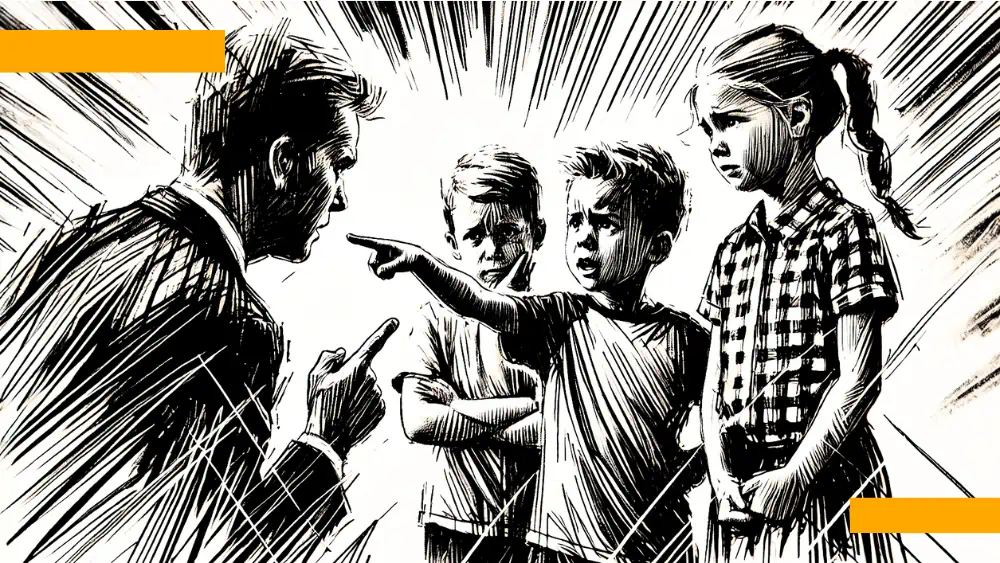 illustration: DALL-E
illustration: DALL-EFor the human species, creating lasting relationships, knowing who is worth cooperating with and who to avoid, is valuable. Evolution has equipped us with skills that enable us to assess the moral actions of others. One element of such an assessment may be determining how likely it is that someone will deceive us. This approach implies that people who declare themselves moral and then act differently - may pose a threat.
Studies conducted on adults have shown that people who exhibit moral hypocrisy, that is, people who not only act immorally, but also in a way that contradicts what they declare, are judged as worse than people who are immoral but honest about it. Many studies indicate that such hypocrites are judged worse than people whose behaviour does not contradict their declared opinions, being perceived as deceitful and untrustworthy.
Scientists have long observed that children are particularly sensitive to immoral behaviour in others and prefer pro-social attitudes. However, few studies determine whether children are able to recognize moral hypocrisy and how it affects their judgment, which is why scientists from SWPS University decided to look into this issue. They conducted three experiments as part of the study, and published their results in the journal Developmental Science.
The scientists worked with children aged 4-6. In one experiment, preschoolers watched a video featuring animal-shaped puppets, one of which was building a tower of blocks and the other would then destroy it. One of the puppets represented an attitude of moral hypocrisy, and thus seemingly followed moral norms, but its behaviour contradicted this.
By switching roles in the scenes, the scientists were able to confirm the hypotheses: children assessed hypocrites more negatively than characters who simply behaved inappropriately by destroying buildings, and what`s more - the assessment of the entire event involving the former was more negative.
The experiment confirmed that children distinguish hypocrites from other people and, like adults, assess them more negatively. The second experiment showed, in turn, that hypocrites are perceived as worse due to the contradictory signals they send to their surroundings.
The work of scientists from USWPS contributes new knowledge to research on human morality, including the theory of moral hypocrisy.
– It is also crucial to understand the significance of negative assessment of such people in the context of undertaking cooperation. Moral hypocrisy threatens group work by undermining trust. In addition, hypocrites who send misleading signals disrupt the integrity of the group, which is essential for cooperation – explained Katarzyna Myślińska-Szarek, PhD, from the Faculty of Psychology in Sopot at SWPS University, who conducted the research together with Wiesław Baryła, PhD, a professor at SWPS University.
The researchers point out that it is worth looking at the results of the experiments more broadly, e.g. in terms of building social trust. Early detection of hypocrisy may be an important cognitive function, enabling children to better distinguish between trustworthy and untrustworthy people in their environment. Similar sensitivity may result from the need to accurately recognize allies.
The scientists conclude that authenticity and consistency in moral education of the youngest children are also very important, and caregivers should be mindful of their actions being consistent with their declarations, because - as it turns out - children are discerning observers of moral integrity.
source: PAP Nauka w Polsce
COMMERCIAL BREAK
New articles in section Skills and knowledge
War reporter in the new reality. Evolving techniques, same purpose
KFi
What happens when war breaks out just across the border and journalists aren't ready? Polish reporters faced that question after Russia invaded Ukraine in 2022. Lacking training, they improvised: blurred details, hid names, and balanced trauma with truth.
A heuristic trap in media coverage. How loud headlines boost fear
Bartłomiej Dwornik
A negative message that rests on emotion lifts the sense of threat by 57%. Why do reports of a plane crash drive investors away from airline shares? Why do flood stories spark worry about the next deluge? The pattern is irrational yet clear and proven.
How LLMs are reshaping SEO. Smart content strategies for the age of AI
BDw
For years, SEO was a fairly predictable game. Pick the right keywords, optimize your content, and watch your website climb the rankings. But today, a silent revolution is underway - and it`s being led by large language models (LLMs) like ChatGPT, Claude, Gemini, and DeepSeek.
See articles on a similar topic:
On TikTok, Music Rules. Three Tips from an Expert on How to Leverage It
BRM
Music dominates TikTok – more specifically, well-chosen music, as it often determines the success of a video, educational campaign, or advertisement. How should a company select music for TikTok content? Tips from Wojciech Psiuk, music supervisor from Sirens.
Max Weber's Theory of Political Sociology
Krzysztof Dowgird
Max Weber, a German sociologist who lived from 1864 to 1920, was undoubtedly the greatest non-Marxist sociologist of political relations. He had a tremendous and enduring impact on many branches of social sciences, including the sociology of political relations.
How ChatGPT, Google Gemini, and Other Large Language Models Work
Krzysztof Fiedorek
These powerful algorithms can generate text, translate languages, write various types of creative content, and answer your questions in a way that often feels like a conversation with a person. But how is it possible for a machine to mimic human intelligence so well?
Sarcasm in Communication. A Study by INSEAD Researchers
Krzysztof Fiedorek
Sarcasm can be a valuable tool in interpersonal communication, but its effectiveness depends on the context and the relationship between the sender and the receiver. Researchers at INSEAD have shown that well-utilized sarcasm can be a powerful asset in business language and advertising.





























